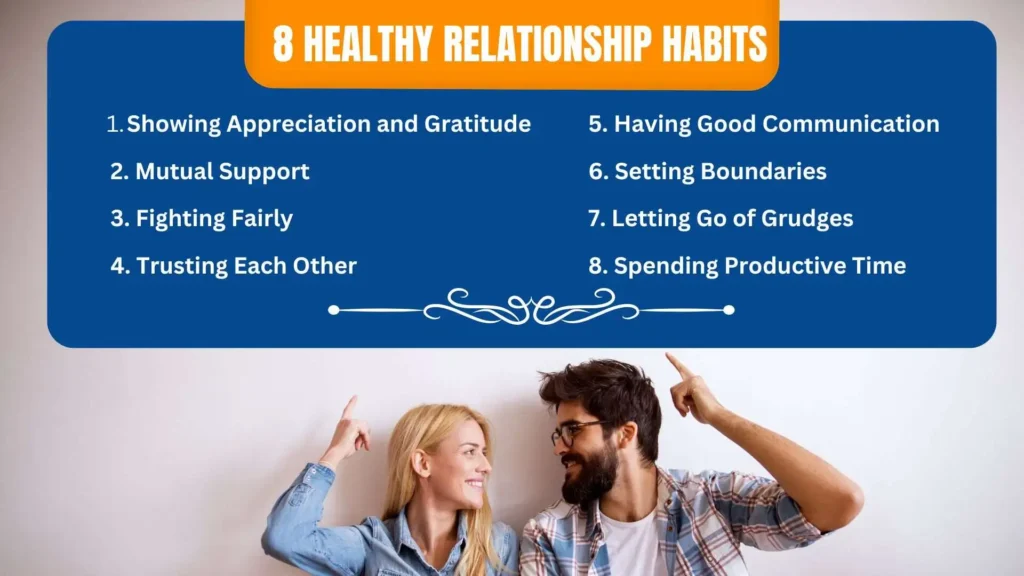Are you looking to form a healthier relationship with your partner? Healthy relationship habits are essential for long-term happiness and mutual growth.
Several key aspects and healthy habits characterize a healthy couple relationship. From effective communication and trust-building to shared activities and mutual support, these healthy habits for relationships will help you and your partner connect on a deeper level.
Are you ready to transform your relationship? Get your hands on expert-backed habits that can improve your connection and bring joy into your everyday interactions.
Table of Contents
8 Healthy Relationship Habits
Developing and maintaining a healthy relationship is much like tending to a garden. It requires attention, care, and a lot of patience. But what exactly are the habits that contribute to a healthy relationship?
Following are 10 essential habits for a healthy relationship.

1. Showing Appreciation and Gratitude
Having a strong and lasting relationship involves numerous factors, but one of the most impactful is showing appreciation and gratitude.
Appreciation is acknowledging the value and effort your partner brings to the relationship. Likewise, gratitude goes hand in hand with appreciation. It involves recognizing and being thankful for the positive aspects of your partner.
These actions strengthen the bond between partners and foster a positive environment where love and respect flourish. Practicing gratitude is also a self-love habit that increases your self-esteem before your partner.
Regularly showing appreciation and gratitude builds a healthy relationship. When your partner feels valued and appreciated, you are more likely to face challenges together and support each other through tough times.
Similarly, these small but hallmarks create a positive cycle within a healthy relationship. As you express these sentiments, your partner will likely reciprocate, fostering a mutually reinforcing environment of love and respect.
Various Ways for Showing Appreciation and Gratitude
- Verbal expression of gratitude: Saying “thank you” or “I appreciate you” can make a significant impact.
- Acts of Service: “Actions often speak louder than words”. Performing acts of service, such as helping each other with chores, cooking a favorite meal, or running an errand, shows appreciation in a great way.
- Gratitude in communication: Incorporate gratitude into your everyday communication.
- Reflect on positive moments: Reflect on positive moments in your relationship.
2. Mutual Support
Mutual support is one of the most vital elements in a good relationship. It involves both partners actively contributing to each other’s well-being and personal growth.
This foundational habit nurtures love and understanding and fortifies the bond between partners. Whether embarking on a new relationship or seeking to enhance an existing one, understanding the importance of supporting each other can transform your connection into a thriving partnership.
As Audrey Hepburn says, “The best thing to hold onto in life is each other.”
When partners feel supported, they experience higher happiness and lower stress levels. This emotional security allows individuals to be authentic without fear of judgment, fostering a deeper connection.
Similarly, supporting each other encourages personal growth and development. When both partners cheer each other on, they will be more likely to pursue their goals and dreams in a relationship where both partners cheer each other on.
How to Incorporate Support in Your Relationship
- Active Listening: Fully concentrate, understand, respond, and remember your partner’s words.
- Be Available: Make time for your partner and be available when needed.
- Share responsibilities: Equally share responsibilities, whether household chores or financial obligations. It is a practical way of supporting each other.
- Positive Reinforcement: Celebrate their achievements, no matter how small, and offer words of encouragement during challenging times.
3. Fighting Fairly
Conflict is an inevitable part of any relationship. However, how couples manage these conflicts can significantly impact the quality and longevity of their relationship.
One of the most essential healthy relationship habits is learning to fight fairly. Engaging in respectful and constructive arguments allows both partners to express their feelings without any fear of judgment or escalation.
Moreover, fair fighting is about finding solutions rather than winning arguments. This approach encourages partners to work together to resolve issues, leading to more effective and long-lasting resolutions.
This practice helps resolve disagreements effectively and strengthens the bond between partners.
How to Fight Fairly in a Healthy Relationship
- Focus on the Issue at Hand: During disagreements, it is crucial to stay focused on the specific issue rather than attacking each other personally.
- Use “I” Statements: Using “I” statements helps express feelings without blaming others.
- Listen Actively: Fully concentrate on what your partner is saying without interrupting or planning your response while they speak.
- Stay Calm and Respectful: Staying calm and respectful helps keep the discussion productive and focused on resolution, a fundamental aspect of healthy relationship habits.
4. Trusting Each Other
All healthy relationships are built on trust. Without trust, even the strongest relationships can crumble under doubt and insecurity.
Trust provides emotional security, allowing both partners to feel safe and valued. When trust is present, partners can confidently rely on each other, a cornerstone of healthy relationship habits.
Similarly, when partners trust each other, they will share true feelings, leading to better understanding and fewer misunderstandings.
A study was conducted on Eastern Illinois University’s campus. 65 young adults (ages 18-24) took a nine-question survey. Every participant agreed that trust is the cornerstone of a successful, healthy relationship. Surprisingly, nearly 50% of them had faced infidelity or a breach of trust from their partners.
Trust enhances emotional and physical intimacy. Knowing that your partner has your back allows for a deeper emotional connection and more fulfilling physical interactions.
Ways to Build Trust in a Relationship
- Consistent Honesty: Being truthful with your partner, even when it’s difficult, fosters an environment of transparency and reliability.
- Keep Promises: By keeping promises, both partners can depend on each other.
- Forgive and move forward: Holding onto grudges can erode trust, so it’s important to address issues, forgive, and focus on the future.
5. Having Good Communication
How we communicate, whether with a partner, friend, or family member, can significantly impact the quality and longevity of our connections.
Good communication involves more than just talking. It encompasses active listening, understanding nonverbal cues, and expressing oneself clearly and honestly.
Good communication is like a glue that holds relationships together. It helps partners understand each other’s needs, resolve conflicts, and build a stronger emotional connection.
Without effective communication, misunderstandings and resentment can easily creep in, leading to a breakdown in the relationship.
Furthermore, being open about your vulnerabilities can deepen intimacy. Sharing your goals, dreams, and hopes with your partner creates a deeper emotional bond.
Practical Tips for Better Communication
- Setting Aside Quality Time: Set aside dedicated time to talk without distractions, ensuring you can fully focus on each other.
- Regular Check-Ins and Updates: Regularly checking in with your partner about their feelings and what’s going on in their life can help you stay connected.
- Open Expression: Share your thoughts, feelings, and needs openly and honestly.
- Non-Verbal Communication: Pay attention to the body language of your partner, facial expressions, and tone of voice.
6. Setting Boundaries
Setting boundaries is an essential healthy relationship habit. Boundaries are guidelines or limits a person sets to define acceptable behavior from others.
Boundaries help maintain individuality while fostering a respectful and supportive partnership. They prevent misunderstandings and conflicts, ensuring both partners feel safe and valued.
Some types of boundaries that you can build for your healthy relationship include
- Emotional Boundaries: Emotional boundaries protect your feelings and ensure that you do not take on the emotional burden of others.
- Physical Boundaries: Physical boundaries pertain to personal space and physical contact. Respecting these boundaries is crucial for comfort and safety in any relationship.
- Intellectual Boundaries: Intellectual boundaries respect each other’s thoughts, ideas, and opinions.
How can you Set Effective Boundaries in a Relationship?
- Identifying Your Boundaries: The first step in setting boundaries is self-awareness. Understand what makes you uncomfortable and what you need to feel respected and safe in the relationship.
- Communicating Boundaries Clearly: Once you’ve identified your boundaries, communicate them clearly to your partner.
- Enforcing Boundaries: It’s important to enforce your boundaries consistently. If your partner crosses a boundary, address it immediately and explain why it’s important to you.
7. Letting Go of Grudges
Grudges are persistent feelings of resentment or ill will towards someone for a past offense. They can decay over time, increasing tension and conflict in relationships. All successful people forgive and move on in their lives.
Letting go of past hurts and misunderstandings is a crucial habit for maintaining a healthy relationship. Holding onto grudges can poison a relationship’s atmosphere. They create barriers to open communication and trust, making it difficult to resolve conflicts and move forward.
Similarly, holding grudges can lead to chronic stress, anxiety, and depression. The negative emotions associated with grudges can drain your energy and happiness.
But forgiving and moving past grievances strengthens your relationship. It fosters a deeper emotional connection and a more resilient bond.
Tips for Letting Go of Grudges
- Identify the Root Cause: The first step in overcoming a grudge is identifying its root cause. Understand what specifically upsets you and why it continues to affect you.
- Communicate Your Feelings: Openly discuss your feelings with your partner.
- Practice Empathy: It involves understanding and sharing another person’s feelings. Once you do that, you can better understand actions and intentions of the partner.
8. Spending Productive Time
Productive time refers to meaningful and enriching moments spent together. It’s not just about being physically present but also about engaging in activities that strengthen the bond between partners.
Maintaining healthy relationship habits is crucial for maintaining strong and fulfilling connections. One important habit that contributes to relationship well-being is spending productive time together.
Engaging in meaningful activities together strengthens the emotional connection between partners. Whether sharing a meal or going for a walk, these moments foster closeness and intimacy.
When couples spend productive time together, they learn more about each other’s personalities, likes, and dislikes. This deeper understanding helps build a stronger, more trusting relationship. By spending productive time, you can easily promote healthy habits.
Ways to spend Productive Time in a Healthy Relationship
- Setting Aside Regular Quality Time: Setting aside regular time for each other, whether daily or weekly, ensures that you prioritize your relationship amidst busy schedules.
- Learning Together: Taking a class or workshop together can be an exciting way to bond.
- Engaging in shared Hobbies and interests: Finding common interests and hobbies can be a fun way to spend time together. Whether cooking, hiking, or reading, shared activities create enjoyable experiences and lasting memories.
What are the Healthy Texting Habits in a Relationship?
In the digital age, texting has become fundamental to relationship communication. It’s quick, convenient, and a great way to stay connected throughout the day.
Texting can bridge the gap between face-to-face interactions, allowing couples to maintain a connection even when apart. But always try to develop healthy social media habits whenever you intend to text your partner.
Some healthy texting habits in a relationship include:
- Daily Check-ins: Regular check-ins, such as a “Good morning” or “How was your day?” text, can maintain a sense of connection.
- Sharing moments and memories: Texting can be a great way to share moments from your day. Sending a photo of something that reminded you of your partner or recounting a funny incident can keep the connection lively and personal.
- Expressing Affection and Gratitude: Don’t underestimate the power of a simple “I love you” or “Thank you” text. Expressing affection and gratitude regularly strengthens the emotional bond and fosters positive feelings.
- Using emojis and GIFs wisely: Emojis and GIFs can add a good expressive element to your texts. However, they should be used to complement your message, not replace words. Overuse can make texts seem insincere or childish.
Conclusion
Healthy relationship habits ensure a prolonged and stable connection between you and your partner. Mutual trust is an important healthy habit for any relationship. Good communication will make time productive between you and your partner, and it is a sign of a good relationship. Always forgive small mistakes and let go of grudges. These small but effective habits can contribute to a better and more romantic relationship.
FAQs
How can you identify a healthy relationship?
Identifying a healthy relationship involves looking for mutual respect, trust, and effective communication. Both partners should trust each other and feel safe while expressing their thoughts and emotions, and there should be a balance of power and equality. Support each other’s growth and maintain healthy boundaries. Conflict resolution should be constructive without resorting to blame or aggression. Shared values and goals, alongside the ability to spend time apart while remaining connected, are also key indicators of a thriving, healthy relationship.
How to maintain a healthy relationship?
Maintaining a healthy relationship requires good and open communication, trust, and mutual respect. Regularly express appreciation and affection and support each other’s personal growth. Address conflicts calmly and constructively, ensuring both voices are heard. Maintain healthy boundaries and balance time together with individual pursuits. Continuously nurture the emotional and physical intimacy to strengthen your connection.




